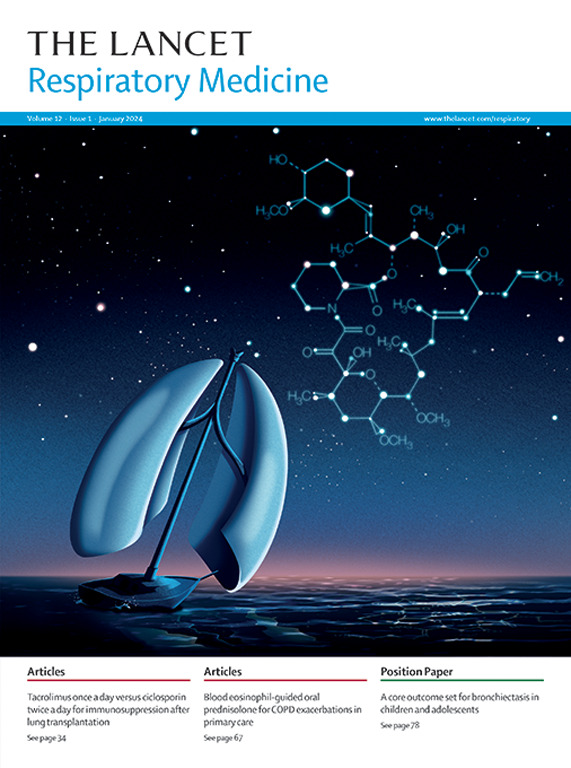Nivolumab plus ipilimumab versus carboplatin-based doublet as first-line treatment for patients with advanced non-small-cell lung cancer aged ≥70 years or with an ECOG performance status of 2 (GFPC 08–2015 ENERGY): a randomised, open-label, phase 3 study
IF 38.7
1区 医学
Q1 CRITICAL CARE MEDICINE
引用次数: 0
Abstract
Background
Combined treatment with anti-PD-1 and anti-CTLA-4 antibodies has shown superiority over chemotherapy in patients with advanced non-small-cell lung cancer (NSCLC), but data for older patients (aged ≥70 years) with an Eastern Cooperative Oncology Group (ECOG) performance status of 0–1 or those with an ECOG performance status of 2 are scarce. We aimed to test the superiority of the PD-1 antibody nivolumab and the CTLA-4 antibody ipilimumab over platinum-based doublet chemotherapy as first-line treatment in patients with NSCLC aged 70 years or older or with an ECOG performance status of 2.Methods
This open-label, multicentre, randomised, controlled, phase 3 trial was done at 30 hospitals and cancer centres in France. Eligible patients had stage IV histologically proven NSCLC, with no known oncogenic alterations, and were either aged 70 years or older with ECOG performance status of 0–2 or younger than 70 years with an ECOG performance status of 2. Patients were randomly assigned (1:1) centrally, using a computer-generated algorithm stratified by age (<70 vs ≥70 years), ECOG performance status (0–1 vs 2), and histology (squamous vs non-squamous) to receive nivolumab plus ipilimumab or platinum-based doublet chemotherapy (carboplatin [area under the curve ≤700 mg] plus pemetrexed [500 mg/m2 intravenous infusion every 3 weeks] or carboplatin [on day 1; area under the curve ≤700 mg] plus paclitaxel [90 mg/m2 as intravenous infusion on days 1, 5, and 15, every 4 weeks]). The primary endpoint was overall survival; secondary endpoints included progression-free survival and safety. All efficacy analyses were performed in the intention-to-treat population, which included all randomly assigned patients. Safety was analysed in the safety analysis set, which included all randomly assigned patients who received at least one dose of study treatment and who had at least one safety follow-up. The trial is registered with ClinicalTrials.gov, NCT03351361.Findings
The trial was stopped early for futility on the basis of a pre-planned interim analysis after 33% of the expected events had occurred. Between Feb 12, 2018, and Dec 15, 2020, 217 patients were randomly assigned, of whom 216 patients were included in the final analysis, with 109 patients in the nivolumab plus ipilimumab group and 107 in the chemotherapy group; median age was 74 years (IQR 70–78). Median overall survival was 14·7 months (95% CI 8·0–19·7) in the nivolumab plus ipilimumab group and 9·9 months (7·7–12·3) in chemotherapy group (hazard ratio [HR] 0·85 [95% CI 0·62–1·16]). Among patients aged 70 years or older with an ECOG performance status of 0–1 (median age 76 years [IQR 73–79]), median overall survival was longer in the nivolumab plus ipilimumab group than the chemotherapy group: 22·6 months (95% CI 18·1–36·0) versus 11·8 months (8·9–20·5; HR 0·64 [95% CI 0·46–0·96]). Among patients with an ECOG performance status of 2 (median age 69 years [IQR 63–75]), median overall survival was 2·9 months (95% CI 1·4–4·8) in the nivolumab plus ipilimumab group versus 6·1 months (3·5–10·4) in the chemotherapy group (HR 1·32 [95% CI 0·82–2·11]). No new safety signals were reported. The most frequent grade 3 or worse adverse events were neutropenia (28 [27%] of 103 patients) in the chemotherapy group and endocrine disorders (five [5%] of 105 patients), cardiac disorders (ten [10%] patients), and gastrointestinal disorders (11 [11%] patients) in the nivolumab plus ipilimumab group.Interpretation
The study showed no benefit of nivolumab plus ipilimumab combination in the overall study population. As a result of early stopping, the trial was underpowered for primary and secondary endpoints; however, the finding of better survival with nivolumab plus ipilimumab compared with platinum doublet in the subgroup of older patients with NSCLC with an ECOG performance status of 0–1 warrants further study.Funding
Bristol-Myers Squibb.年龄≥70岁或ECOG表现为2级的晚期非小细胞肺癌患者的一线治疗(GFPC 08-2015 ENERGY):Nivolumab联合ipilimumab与卡铂双药对比(GFPC 08-2015 ENERGY):一项随机、开放标签的3期研究
背景在晚期非小细胞肺癌(NSCLC)患者中,抗PD-1抗体和抗CTLA-4抗体的联合治疗已显示出优于化疗的效果,但针对东部合作肿瘤学组(ECOG)表现为0-1级或ECOG表现为2级的老年患者(年龄≥70岁)的数据却很少。我们的目的是检验 PD-1 抗体 nivolumab 和 CTLA-4 抗体 ipilimumab 作为 70 岁或以上或 ECOG 表现为 2 的 NSCLC 患者一线治疗的疗效是否优于铂类双联化疗。方法这项开放标签、多中心、随机对照的 3 期试验在法国的 30 家医院和癌症中心进行。符合条件的患者均为组织学证实的 NSCLC IV 期患者,无已知致癌基因改变,年龄在 70 岁或以上且 ECOG 表现为 0-2 级,或年龄在 70 岁以下且 ECOG 表现为 2 级。患者随机分配(1:1),采用计算机生成的算法,按年龄(70 岁 vs ≥70 岁)、ECOG 表现状态(0-1 vs 2)和组织学(鳞状 vs 非鳞状)分层,接受 nivolumab 加 ipilimumab 或铂类双联化疗(卡铂[曲线下面积≤700 毫克]加培美曲塞[每 3 周 500 毫克/平方米静脉注射]或卡铂[第 1 天;曲线下面积≤700 毫克]加紫杉醇[90 毫克/平方米,静脉注射,第 1、5 和 15 天,每 4 周一次])。主要终点是总生存期,次要终点包括无进展生存期和安全性。所有疗效分析均在意向治疗人群中进行,包括所有随机分配的患者。安全性分析在安全性分析组中进行,该分析组包括所有随机分配的患者,他们至少接受了一个剂量的研究治疗,并且至少进行了一次安全性随访。该试验已在ClinicalTrials.gov注册,编号为NCT03351361.研究结果在33%的预期事件发生后,根据预先计划的中期分析,该试验因无效而提前终止。2018年2月12日至2020年12月15日期间,217名患者被随机分配,其中216名患者纳入最终分析,nivolumab加伊匹单抗组109人,化疗组107人;中位年龄为74岁(IQR 70-78)。nivolumab加伊匹单抗组的中位总生存期为14-7个月(95% CI 8-0-19-7),化疗组为9-9个月(7-7-12-3)(危险比[HR] 0-85 [95% CI 0-62-1-16])。在70岁或以上、ECOG表现为0-1的患者中(中位年龄76岁[IQR 73-79]),nivolumab联合伊匹单抗组的中位总生存期长于化疗组:分别为22-6个月(95% CI 18-1-36-0)和11-8个月(8-9-20-5;HR 0-64 [95% CI 0-46-0-96])。在ECOG表现为2级(中位年龄69岁[IQR 63-75])的患者中,nivolumab加伊匹单抗组的中位总生存期为2-9个月(95% CI 1-4-4-8),而化疗组为6-1个月(3-5-10-4)(HR 1-32 [95% CI 0-82-2-11])。未报告新的安全性信号。最常见的3级或更严重不良事件是化疗组的中性粒细胞减少(103例患者中有28例[27%]),以及nivolumab加伊匹单抗组的内分泌紊乱(105例患者中有5例[5%])、心脏紊乱(10例[10%])和胃肠道紊乱(11例[11%])。由于提前停药,该试验的主要和次要终点指标不足;然而,在ECOG表现状态为0-1的老年NSCLC患者亚组中,与铂类双药相比,nivolumab加伊匹单抗的生存率更高,这一发现值得进一步研究。
本文章由计算机程序翻译,如有差异,请以英文原文为准。
求助全文
约1分钟内获得全文
求助全文
来源期刊

Lancet Respiratory Medicine
RESPIRATORY SYSTEM-RESPIRATORY SYSTEM
CiteScore
87.10
自引率
0.70%
发文量
572
期刊介绍:
The Lancet Respiratory Medicine is a renowned journal specializing in respiratory medicine and critical care. Our publication features original research that aims to advocate for change or shed light on clinical practices in the field. Additionally, we provide informative reviews on various topics related to respiratory medicine and critical care, ensuring a comprehensive coverage of the subject.
The journal covers a wide range of topics including but not limited to asthma, acute respiratory distress syndrome (ARDS), chronic obstructive pulmonary disease (COPD), tobacco control, intensive care medicine, lung cancer, cystic fibrosis, pneumonia, sarcoidosis, sepsis, mesothelioma, sleep medicine, thoracic and reconstructive surgery, tuberculosis, palliative medicine, influenza, pulmonary hypertension, pulmonary vascular disease, and respiratory infections. By encompassing such a broad spectrum of subjects, we strive to address the diverse needs and interests of our readership.
 求助内容:
求助内容: 应助结果提醒方式:
应助结果提醒方式:


